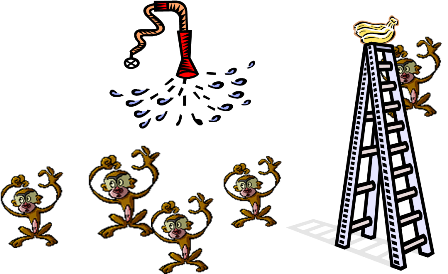In this experiment, five monkeys are put into a large cage. There’s a stool in the middle of the cage and a banana is hung from the ceiling above the stool. Outside the cage, an observer has a hose filled with ice water. It hardly needs mentioning that monkeys like bananas better than ice cold showers.Within a few minutes, the most daring of the monkeys climbs on the stool to get the banana. This effort immediately engenders an ice cold shower for all of the monkeys. Several minutes later, another monkey tries, with the same result. The monkeys quickly learn the relationship between “get on the stool” and “an ice cold shower” and choose a way to protect themselves. As soon as one monkey even tries to go near the stool, the other four jump on him, screaming and gesticulating, to stop him before the observer gets the “signal” to spray them all with ice water.
Some time and several fights later, all the monkeys have learned the rule, and become quickly indifferent to the stool, as if it weren't even there. The defensive tactic they had imagined becomes superfluous. The banana stays where it is, safe and sound on the ceiling. Life in the cage is organized around this new reality. At this point in the experiment, the observer takes out one of the monkeys and replaces him with a new monkey (one that doesn't know anything about the cold shower). The new monkey immediately climbs on the stool to get the banana, and after a moment’s hesitation, the four others jump on him. The new monkey learns a quick lesson, without any action on the part of observer. The ice cold shower is no longer necessary, and the banana rots nicely on the ceiling.
The experiment continues. Each of the original four monkeys are replaced, one after another, exactly like the first replacement. Each time, the scene repeats itself: the new one tries to climb on the stool, is jumped on by the four others, until they are sure he has learned his lesson. The rule “no one should climb on the stool” is a lesson that new monkeys learn in this group that is specific to this group and to no other.
In the end, none of the five monkeys knows why they should not get on the stool, yet they defend the law with more vehemence than the original five. No one knows that, in fact, it was a quite effective way to avoid getting an ice cold shower. None of the new monkeys ever got the ice cold shower. They were stopped before the shower came. Even though the original reason has disappeared, the rule has become a norm for this group. A self-perpetuating norm, kept in place by interactions, and never questioned.
This is very much happening with our lives.....why we don't' stop taking things straight as they are presented to us and start realizing the real reason for doing something? Why don't we stop doing things only because everybody does it? Is majority always right?
